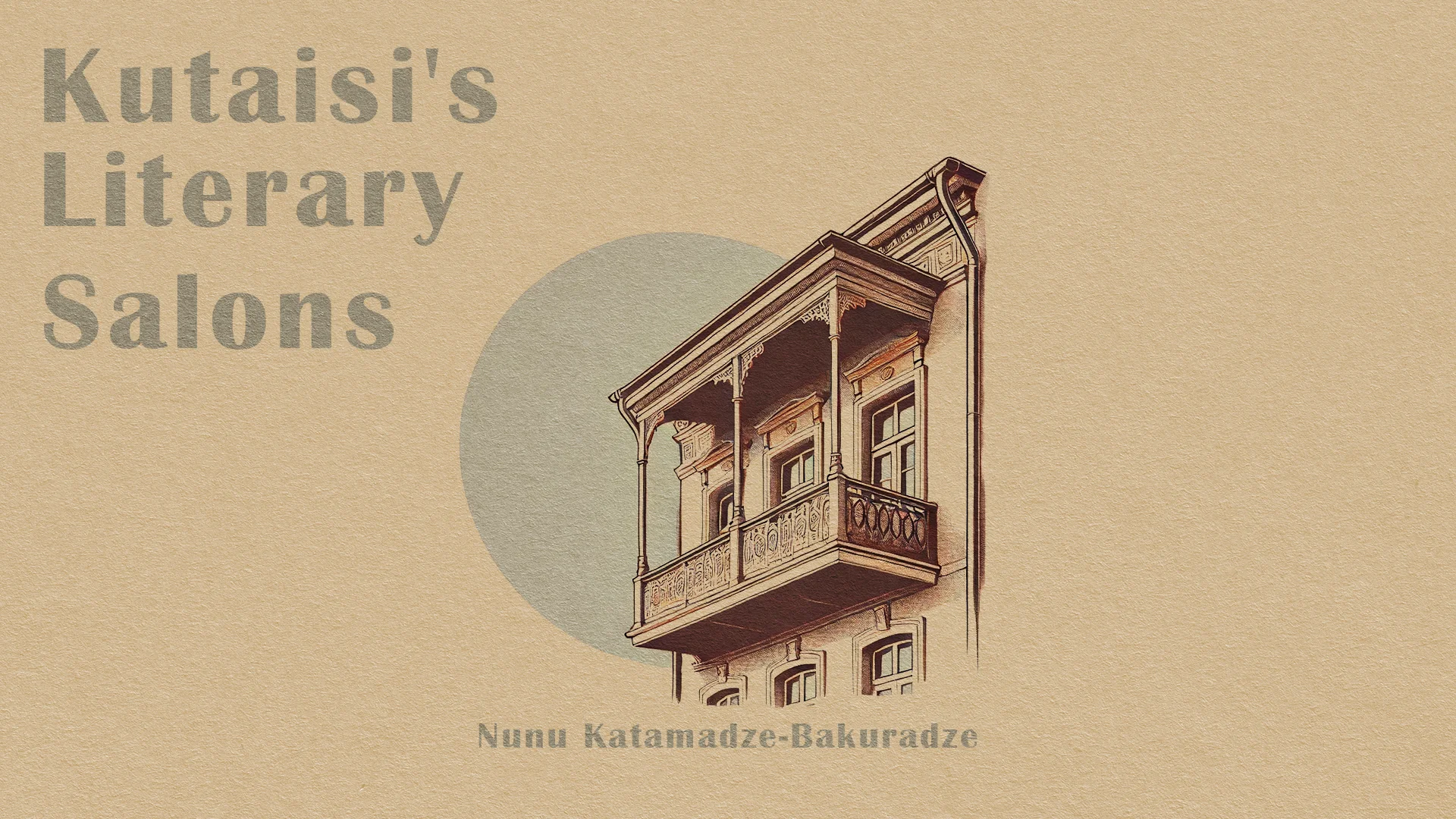
Author: Nunu Katamadze-Bakuradze
In an era when Georgia lacked theaters, magazines, newspapers, and formal cultural institutions, literary gatherings held within private homes nurtured and advanced the nation’s intellectual and cultural life. Across Europe and Russia, family salons became cultural staples, serving as crucibles for ideas and artistic exchange. Georgia, too, saw the rise of these gatherings, particularly in the 19th century, when salons were hosted by prominent Georgian families, such as the Chavchavadzes and Orbelians. Progressive thinkers with refined literary sensibilities, these families helped shape Georgian identity and foster a deeper connection to national culture.
Georgia’s cities—including Gori, Telavi, Batumi, and Kutaisi—developed rich traditions of literary salons. In Kutaisi, gatherings became places of cultural pride, uniting the people and promoting a shared sense of purpose. These meetings went beyond admiration for the city’s landmarks, connecting residents with prominent figures and ideals in an atmosphere of intellectual and social vitality.
In the 1860s, Kutaisi homes began hosting regular gatherings where the country’s leading minds discussed Georgian culture, literature, and public life. One notable gathering, which included the writer Ilia Chavchavadze, took place on April 18, 1874. This was just one among countless occasions when families opened their doors to enrich Georgian intellectual life.
In 1878, when a Georgian drama troupe made a special visit to Kutaisi, residents not only greeted them with applause but also hosted them in private homes, turning these gatherings into spontaneous celebrations of Georgian art. Poet Akaki Tsereteli, returning from studies in St. Petersburg, became a frequent guest at such gatherings in the homes of Mamuka Nikoladze (father of Niko Nikoladze) and Besarion Kheltuplishvili, where he found “spiritual food and friendship.” These events often resembled “literary banquets,” with guitar music, eloquent speeches, and toasts honoring the arts. On one such evening, the poet Luka Razikashvili performed, and Niko Lomouri’s speech left a lasting impression. The romantic ballad “Netav Rad Stiri Dedilo” was sung, lending the night a sense of poetic reverence.
Dimitri Nazarishvili, a famed doctor, frequently hosted such gatherings in his home. The guests, united by their passion for Georgian literature, would often find themselves engaged in spirited discussions that blurred the line between scholarship and friendship. Similarly, Davit Abdushelishvili, a city notary and a prominent member of Kutaisi’s intellectual community, maintained an open house on the corner of Oldenburg and Tbilisi streets (now Tabidze and Tamar Mefi streets). Here, artists and thinkers gathered to debate literature, art, and public life, exploring the most pressing social issues of the time.
Kutaisi’s administration played an active role in supporting these gatherings. City officials such as Davit Lortkifanidze, along with the head of the Georgian gymnasium Ioseb Otkheli, Silovan Khundadze, and other esteemed citizens, frequented these family salons. Poets, actors, and musicians joined, lending an air of festivity and gravitas. It was in such a salon that the Ishkhneli sisters first sang for an audience, marking the start of a tradition of literary and theatrical evenings in the city.
The family of Mitrofane Lagidze, who pioneered non-alcoholic beverages, also hosted dinner gatherings characterized by their generosity and deep engagement with community life. Similarly, Merab Lortkipanidze’s home on Meskheti Street (now Ninoshvili Street) was a favorite venue for cultural gatherings, welcoming guests such as Akaki Tsereteli, Alexander Kazbegi, Niko Mari, Petre Mirianashvili, and Bishop Gabriel Kikodze. When Ilia Chavchavadze visited Kutaisi, one of his hosts was Merab Lortkipanidze. Later, his son, Niko Lortkipanidze, hosted luminaries of the “Blue Horns” circle, including Titian Tabidze, Paolo Yashvili, and Valerian Gaprindashvili, between 1915 and 1925.
Simon Ghoghoberidze, another well-known intellectual, hosted Ilia Chavchavadze upon his return to Kutaisi for the funeral of Bishop Gabriel. Chavchavadze was welcomed by friends and associates each evening, their gatherings marked by an intimate warmth and admiration that strengthened bonds within the community.
In the 1870s, Nikoloz Kipiani established a successful grocery business in Kutaisi. His daughter, Elena, a musician, married Kutaisi native Anton Lortkipanidze, who translated Molière’s works from French, further enhancing their home’s reputation as a gathering place for literary and artistic minds.
By the early 20th century, Kutaisi’s Gaidamashuk family was known for its refined social gatherings. These events frequently included performances, songs, and storytelling, with guests enjoying both Georgian and European traditions. At their son’s wedding, the family introduced the French “à la buffet” style, hosting guests in their garden before moving the celebration to a grand hotel hall. This event marked one of many ways in which Kutaisi embraced European elegance, adapting foreign influences to Georgian tastes.
Kutaisi’s salons helped the city stay attuned to European cultural developments while simultaneously nurturing local identity. Its residents eagerly learned from one another, supported the arts, and sought opportunities to engage in meaningful conversation with distinguished guests. Thus, Kutaisi’s legacy is one of profound intellectual curiosity and civic pride, a heritage that is woven into the fabric of Georgian culture. This small town with a great cultural history has preserved its salon stories alongside its artistic achievements, embodying the values of warmth, intellect, and hospitality that have defined its citizens for generations.